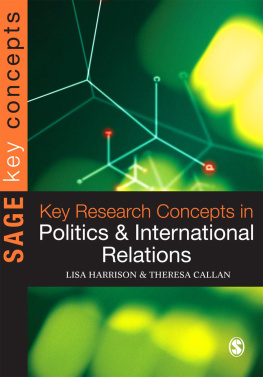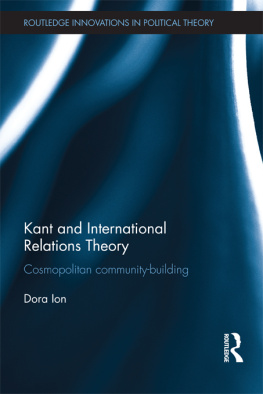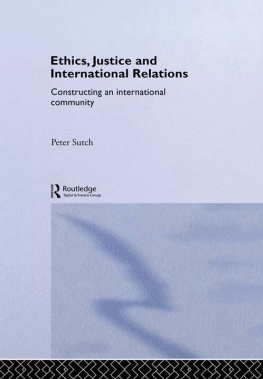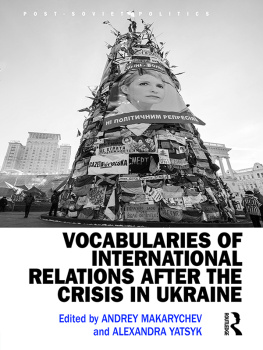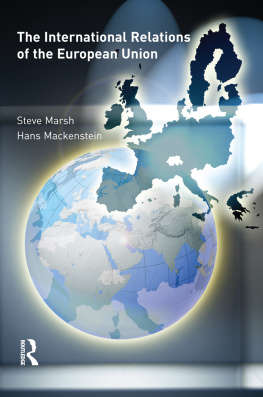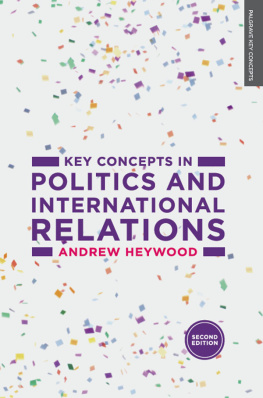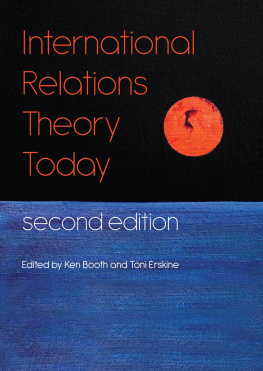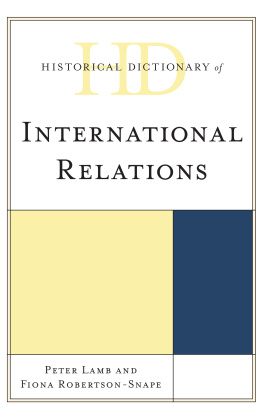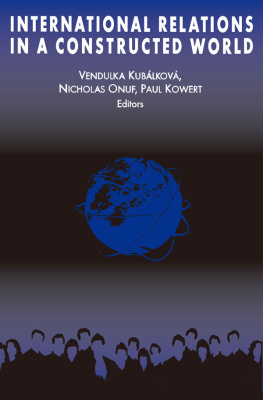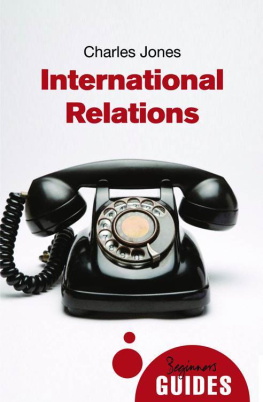Aneek Chatterjee - International Relations Today: Concepts and Applications
Here you can read online Aneek Chatterjee - International Relations Today: Concepts and Applications full text of the book (entire story) in english for free. Download pdf and epub, get meaning, cover and reviews about this ebook. year: 2010, publisher: Pearson, genre: Politics. Description of the work, (preface) as well as reviews are available. Best literature library LitArk.com created for fans of good reading and offers a wide selection of genres:
Romance novel
Science fiction
Adventure
Detective
Science
History
Home and family
Prose
Art
Politics
Computer
Non-fiction
Religion
Business
Children
Humor
Choose a favorite category and find really read worthwhile books. Enjoy immersion in the world of imagination, feel the emotions of the characters or learn something new for yourself, make an fascinating discovery.

- Book:International Relations Today: Concepts and Applications
- Author:
- Publisher:Pearson
- Genre:
- Year:2010
- Rating:5 / 5
- Favourites:Add to favourites
- Your mark:
- 100
- 1
- 2
- 3
- 4
- 5
International Relations Today: Concepts and Applications: summary, description and annotation
We offer to read an annotation, description, summary or preface (depends on what the author of the book "International Relations Today: Concepts and Applications" wrote himself). If you haven't found the necessary information about the book — write in the comments, we will try to find it.
International Relations Today: Concepts and Applications — read online for free the complete book (whole text) full work
Below is the text of the book, divided by pages. System saving the place of the last page read, allows you to conveniently read the book "International Relations Today: Concepts and Applications" online for free, without having to search again every time where you left off. Put a bookmark, and you can go to the page where you finished reading at any time.
Font size:
Interval:
Bookmark:
Aneek Chatterjee
Department of Political Sciencebr
Presidency College, Kolkata
Longman is an imprint of

Delhi Chennai Chandigarh
Aneek Chatterjee, Ph.D., is Associate Professor of Political Science at Presidency College, Kolkata, India. He has written three books, and edited one; and contributed research articles in leading national and international journals. He has presented research papers at international academic conferences in France, Japan, Slovenia and India; and visited Holland, Belgium, Austria and Hungary on academic work. He has received the Fulbright-Nehru Visiting Lecturer Fellowship for 201011 to teach at the University of Virginia, Charlottesville, USA. He also received the ICCR Visiting Chair in Political Science/International Relations to teach in reputed foreign universities. Dr Chatterjee sits in the Editorial Boards of two international/national research journals.
International Relations (IR) is a changing and dynamic discipline. Today, the discipline is different in many ways from the discipline of IR immediately after the Second World War. The impact of globalization or terrorism on IR was almost negligible during that period. Moreover, the postCold War World order has thrown many challenges to the students of IR. Is the postCold War international order a unipolar or a multipolar one? Is globalization eroding the notion of state sovereignty? What would be the impact of energy crisis on world politics? Is the world moving towards economic integration? Is China going to pose an effective challenge to the might of the United States? What is the future of the SAARC or the NAM? What are the major theories in contemporary IR? These and many other pertinent issues require proper analyses in order to understand the nature of the discipline today. This book is a humble attempt at studying such issues. It is primarily meant for students of International Relations in colleges and universities. It would also help civil service aspirants and others interested in the discipline.
In the course of writing this book, I got immense help from several persons and institutions. All members of Pearson Education need special mention in this regard. I wish to particularly thank Praveen Dev, Debjani M. Dutta, Barun Kumar Sarkar and Arani Banerjee of Pearson Education for supporting this project from time to time. I also thank my colleagues and students in the Department of Political Science who raised many interesting questions and debated with me on many issues for providing intellectual stimuli that helped me in the course of writing. The excellent library facilities of Presidency College always boosted my desire to work for the book. My wife Sarbani and daughter Prerna, besides providing mental support, also helped me in computer work, which proved very helpful at times for a tiring person. My sincere thanks to them. Needless to say that the author is responsible for any error or omission in the book. If this book provides any help to students and teachers, I will consider my efforts successful.
ANEEK CHATTERJEE
International Relations (IR) is an important academic discipline and constitutes a significant area of modern social science. It is primarily considered as the study of the relations among nation-states. But this view is oversimplified, because contemporary international relations cover a very broad subject-matter. Yet, for a basic understanding this view is helpful. The complex nature of contemporary IR is analysed later in this chapter. But before going into the details of its nature and scope, a look into the history and development of the study of IR is necessary. This chapter begins with a short history of international relations as an academic discipline, as well as a practice of maintaining relations among political systems, states or pre-states.
As an academic discipline, international relations is not very old. Its systematic study started after the First World War, and universities in West Europe and the United States (US) introduced separate courses on it from the 1920s. But as relations among states or pre-state political systems, the subject is very old. As the relation among nation-states, IR is believed to have developed with the Peace Treaty of Westphalia of 1648, which is considered as the creator of modern nationstates in Europe. But before the birth of modern nation-states, pre-state political systems had developed in different parts of the world. Relations among these pre-state political systems could be viewed, rather incoherently, as the beginning of international relations. But this history of IR is a disputed one because the nature and pattern of interactions among pre-state political systems, or for that matter among the nation-states after the Treaty of Westphalia, raise controversies. It is now generally believed that immediately after the treaty was signed, no structured pattern of international relations originated. And it was not before the French Revolution in 1789 that systematic interactions among nation-states or other types of political systems had developed. If the more recent history of IRsince the Treaty of Westphaliais so controversial, it is not difficult to imagine that pre-state IR is subject to more disputes. Some of the known pre-state political systems that existed before the treaty were: (1) Sumerian city-states like Kish, Karsa, Ur, Lagash; and oriental city-states like Jericho, that existed before 2500 BC; (2) Greek city-states; and (3) large empires in the West and the East. The nature and extent of interactions among prestate political systems differed from time to time, making it difficult to systematize the history of IR in ancient times. Occassional and contradictory references to sporadic diplomatic ties among pre-state political systems did not help either in knowing the history of pre-state IR. It is believed that the Treaty of Westphalia encouraged the rise of the independent nation-states by recognizing territorial sovereignty. The treaty also led to the institutionalization of diplomacy and armies. But immediately after Westphalia, no structured pattern of international relations had developed. International relations, in a modern sense, started to develop when the European nation-state system, born out of the treaty, was transplanted later in the two Americas, Africa and Asia, through the routes of colonialism.
The nation-state system that emerged after Westphalia had undergone a long process of evolution and changes to assume the present nature. During its long process of evolution, this system was influenced, strengthened, and also affected, by several developments: socio-political, economic and scientific. The rise of capitalism, the Industrial Revolution, the French Revolution, the American War of Independence, and colonialism influenced this evolving process till the end of the nineteenth century. In more recent times, since the beginning of the twentieth century, the two world wars; the decolonization process; nationalist movements in Asia, Africa and Latin America; globalization; postmodernism; and IT (Information Technology) revolution exerted tremendous influence over the nation-state system. With the passage of time, nation-states have changed in character to keep pace with the changing times; but their basic nature has remained the same since the Treaty of Westphalia: it is a sovereign territorial unit of people sharing some common feelings, loosely identified as nationalism.
Font size:
Interval:
Bookmark:
Similar books «International Relations Today: Concepts and Applications»
Look at similar books to International Relations Today: Concepts and Applications. We have selected literature similar in name and meaning in the hope of providing readers with more options to find new, interesting, not yet read works.
Discussion, reviews of the book International Relations Today: Concepts and Applications and just readers' own opinions. Leave your comments, write what you think about the work, its meaning or the main characters. Specify what exactly you liked and what you didn't like, and why you think so.

